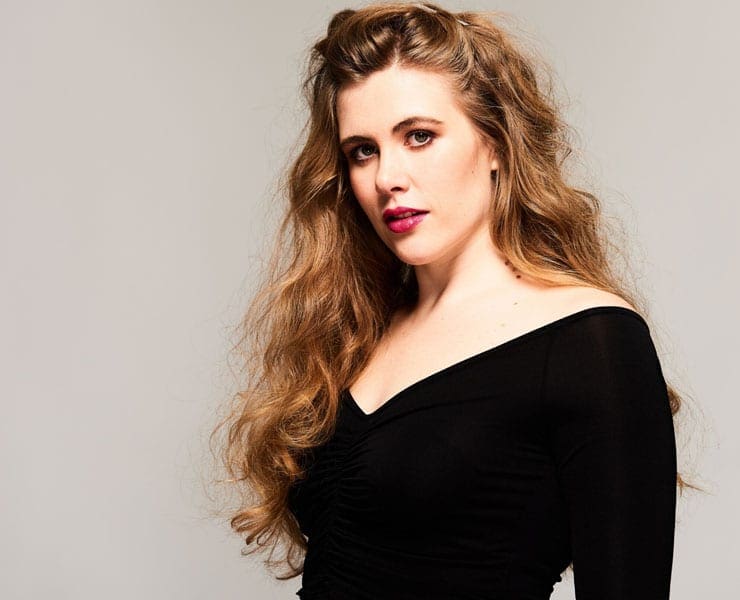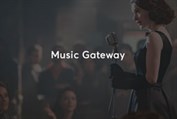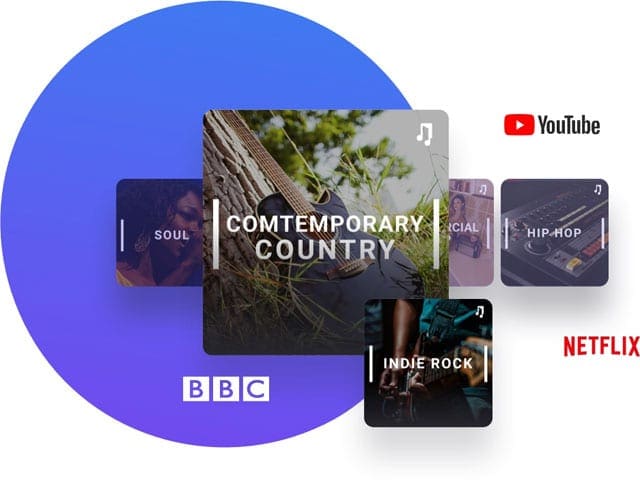Everything You Need To Know About Music Production Libraries
There’s now a huge market for sync licensing and a chance to bring in income throughout the lifetime of a track for both publishers and composers. Production libraries are catalogues of pre-licensed music available to be used for syncs. They are a go-to for advertising agencies, music supervisors for TV and game publishers, website builders and production teams.
Their libraries are filled with high-quality, finished tracks ready to be licensed and placed alongside media. They include music of almost every genre and can be used again and again for different purposes and clients.
You can normally download tracks from their production music albums and playlists.
Production Music vs Commercial Music
Commercial music is made for airplay on radio, music by famous or upcoming musicians that is sold to the general public. Production music is music in the background of trailers, films, TV shows and adverts written by anonymous composers. Music libraries host, distribute, administrate and market thousands of tracks on the behalf of production composers. Contracts in place are usually a 50/50 split between publisher and composer.
Production music is generally used in the background of a scene, advert, video game. Even though it’s designed to be secondary to the visual content, it should still be catchy, well written and emotive. Production music costs significantly less to license then commercially released tracks and does not require the same clearances from rights holders.
How It Works
Production libraries, or stock music libraries, are built up of music written by composers. Usually, a publisher will help a composer get their finished tracks into a production library, or composers can be scouted by the library themselves. Alternatively, composers can simply submit music for licensing to production libraries themselves. To be successful in your composer submissions, you must be sure your track has the potential for sync and is appropriate for the library you are submitting it to. It must be of high quality and sync-ready.
Some libraries specialise in certain genres, whilst others carry a whole selection of production music. It all depends on the angle and objectives of the company. Production libraries are always looking for new music as they need a constant supply of new, contemporary content to keep their customers coming back. Those in charge of submissions and acquisition at production libraries must have good ears and knowledge of the industry; what sells well? Is there a market for this genre of music right now? Does it align with other music in their catalogue if they are a niche library?
If the production library like what they hear, they will offer to purchase or license your music. Once a contract or deal has been agreed, the composer’s music will then be available for licensing by outside media outlets. A music supervisor, or any other creative producer looking for music, may then listen to and request to use the track from the production library. A deal will then be worked out between the supervisor and the library for the exploitation of the track, based on how it will be used, and a license agreed.
The supervisor may then legally use the track for their intended purpose and the production library and composer will be compensated for its use. A singular track may be used for a variety of projects as many times as possible; popular stock music can have long and lucrative life-spans.
How Do Production Libraries and Composers Make Money?
There are two ways a track can generate revenue for the composer who wrote it and the production company that license it:
Sync/licensing fee: usually a one-off licensing or sync fee will be charged by the production library for the use of the track. Sync fees can vary depending on the piece of music, the way in which it will be used and on the reputation of the library. Sync fees are often split between the production library and the composer, however, this depends on the nature of the publishing deal and the contract signed by the composer for the licensing of their music.
Performance royalties: production music should be registered by its rights holders with a performing rights organisation (PROs) just as commercial music should be. This means that when your music is ‘performed’ publically the PRO will collect and pay you performance royalties. The royalties are once again split, as usually the production library will own the publishing rights and the composer will own the master rights.
Sometimes a PRO will issue a blanket license to a group, such as a TV production company, who will pay a one-off fee to license music represented by that organisation. This is done to save sourcing licenses for each and every track the company wants to license. The PRO will grant the blanket license and the company may use the tracks they wish too, but they have to submit regular track listing reports and setlists. This is to enable the PRO to pay the rights holders their royalties and a portion of the licensing fees.
Exclusive And Non-Exclusive Library Deals
Some production libraries will ask to be the sole publishers of your music, they will often pay you upfront for your music and out of your mechanical rights. This means that you, the composer, will only be entitled to performing rights. Others offer non-exclusive deals which allow composers to publish their tracks with multiple production libraries. They might not offer an up-front payment, however, they may allow you to keep both your mechanical and performing rights.
Advances For Composers
Sometimes a production library will employ a composer on an annual contract, paying the composer a yearly advance to live on whilst they compose music exclusively for one library. The advantage of this for the composer is a guaranteed income however it must be paid back in full through the success of their tracks.
Composers may be set a yearly quota of successful tracks which they must fulfil, of which the publishing rights will belong to the production library. The composer must pay back their advance through the success of their tracks, and may only see additional royalty revenue once they have paid back their debt to the library.
Who Uses Production Libraries And Why?
Production libraries are attractive options for sync licenses for a whole range of clients across the entertainment and creative industries. TV and film studios often use them as do games publishing companies, often through music supervisors or by their production team. Creative agencies such as advertising companies and website designers, event planners and marketing teams also source music from production libraries for a variety of their projects. Production music has the opportunity to be used anywhere and can be used for many different clients for many different purposes.
Production libraries are an easy and convenient place to explore and source ready to be licensed tracks. Often they hold thousands of tracks that can be searched by genre, mood, tempo, beats per minute, artist and style. This makes it easy for supervisors and other creatives to find music, as they don’t have to go searching all over the internet and through individual submissions.
Production libraries guarantee music is pre-licensed, this saves time and money discussing licensing terms with all the potential rights holders on a singular song. For commercial tracks, the clearance process can take a long time and can often be rejected by either the recording artist, publisher or the executives at the record label who might not approve of the project. Using tracks sourced from production libraries eliminates these legal discussions and allows for quick and easy approval with only one party.
You may also come into contact with a sync agent, their role is to be a middle man for artists and composers looking for sync licensing opportunities with top music supervisors. Some demand an exclusive sync deal which means if you’re thinking of publishing a composer who has a sync agent, it may be rather difficult.
Setting Up Your Own Production Music Company
There is good money to be made in production music and for many with a good understanding of music business and a passion for it, it can be an attractive business venture. To set up your own production library you’ll need a good platform to host all your perfect music catalogue, a legal team or legal representation to oversee your licensing agreements and a wide scope of music from talented composers.
If you’re wanting to expand your operations but it’s too early to do so, you could enter into agreements with other publishers and work as sub-publisher, assisting in their operations in return for the same promise from them. Sub-publishing means you can harness a global marketplace and open up new opportunities across continents. If you’re starting out, it can also be great for making connections.
Curating And Sourcing Music For Your Library
This is a constant element of running your business, you need new custom music to keep your customers coming back to your library. There are a number of places you can discover new composers and it’s best to try them all. Explore online music platforms like Youtube and Soundcloud, attend music industry events and network, maybe advertise in music publications and online?
You’ll need to decide on the style of music you want to be featured in your library, do you want niche genres? Instrumentals? Synths? Cover songs? Full band accompaniments? Classical or contemporary? Or a broad mix of it all? Whatever your speciality, or if your speciality is universal production music, that is how you will have to market yourself.
Publishing Music and Registration With PROs
When you’ve found some talent and signed their music to your production library, you’ll need to register their tracks with PROs in order to collect performance and mechanical royalties. This will register you as a rights holder and protect your musical copyright, your composer should also register their rights to the track through the PRO in order to collect their royalties.
In the UK, the Performing Rights Society (PRS) are the main royalty collection agency, tracking your performance royalties and paying you accordingly. Their counterpart, the Mechanical Copyright Protection Society (MCPS) collect your mechanical rights and pay you for these too. The PRS also manages online rights across Europe and are growing their rights protection and payment methods across the world.
Until the technology catches up and allows full global rights protection and royalty collection, it’s best to register your published work with rights organisations across the world. In the USA, the leading rights organisations are BMI who collect performance royalties and the Harry Fox Agency who collect mechanical royalties.
Administration And Managing Metadata
As the curator of your production library, it is your job to manage the metadata. When searching for tracks to sync in your music library, clients can find the perfect tracks based on the information listed in their metadata. Metadata information includes the rights owners, writers, producer, date of production, genre, title and recording artist, however, you can also add more information to make it more searchable. Including descriptions of the tracks, beats per minute, mood etc can increase the chances of the right person finding it and licensing it.
Metadata is also important as if it is not all correct, it can affect the protection of the copyright. Metadata must be correct when registered with PROs to ensure all parties are paid correctly. Managing metadata is a time-consuming process given how many tracks you may have in your catalogue, but it’s vital you do it correctly.
Relationships With Music Supervisors, Music Publishers, Production Teams and Creative Agencies
As the publisher for your composer’s music, it’s your job to promote their music for sync opportunities. This benefits you as well as the composer as you own the publishing rights to their music. If their music is chosen for a sync license, you both get paid. Pitching music from your catalogue or projects with supervisors, producers and advertising companies is essential to the success of your production library.
It’s therefore important that you market and promote your production library, this includes networking at entertainment and music industry events. Building up a network of music supervisors, directors, producers, advertisers and marketers is essential to securing pitches and attracting clients to your library. No one’s going to find your production library if you don’t tell them where it is. Music Supervisors often ask publishers to submit music for tv placements or any other project they may be working on, get yourself on that music libraries list. This is all part of promoting your business, without it, you won’t make any money.
Keep up to date with current projects and who’s running them, if you make a connection, touch base with them every now and again to discuss your businesses. The most important thing about contacts is keeping them; be friendly, easy to work with and make authentic connections. Making a good first impression is paramount.
Trade Unions And Associations
Music publishers normally have their own trade associations like MPA (Music Publishers Association). You can join MPA to voice your opinion about current affairs and be more involved in what’s happening in the music publishing world. These music publishing trade associations work with PROs to draft industry standard rate cards and they have their input at negotiating blanket licenses.
Retitling Tracks And Why You Should Watch Out For It
Sometimes publishers will take in tracks and retitle them so the track best describes the mood of the track. When supervisors or other creatives are looking for a laid back, hip hop track they won’t click and listen to a track titled “Jack”, but they will listen to a track called “Laid Back Jack”. Publishers retitle tracks on mostly non-exclusive deals. A composer will have music they made for non-exclusive libraries, giving 10 tracks to a library in Japan, the same 10 tracks to a library in the US and in Africa to represent their music in those territories. These 3 libraries will cross paths one day and claim the same music if they did not retitle their tracks. If the composer has published 10 tracks with those libraries, he needs to register all the retitled names all over again with his PRO so they could be collected on his end. Content ID does make provision as per territory for this.
E&O Insurance
When starting any business venture it’s always best to protect yourself and your business. Errors and omissions insurance is a professional liability ensure that can protect you against claims of neglectful business and inadequate service.
If you’re thinking about setting up your own production library, check out our Global Creative Marketplace to start making contacts across all professions in music. If you’re a composer, submit your music here to find opportunities.
FAQ Section
Q: What does production mean in music?
A record producer or music producer oversees and manages the sound recording and production of a band or performing artist and their music, which may range from recording a single song to recording a full length album. A producer’s role will vary during the recording process depending on the project in hand.
Q: How do you submit music to a music library?
First of all, are you ready to pitch and send your music to the A&R at the production library companies? Are your recordings professionals mixed, mastered and produced as a showreel to present to the A&R professional? If you are ready, here are some handy steps to follow:
- Choose only the very best three to five tracks in your catalog and prepare them using a pitching tool, such as this one here.
- Research the music libraries, production libraries and A&R creatives at the company. Use a CRM tool to manage those contacts
- Once ready to approach them, ensure you give them a short intro, make it personal to them and give them some context to prove you have gone out of your way to make that approach. Maybe referencing where you met them, or a recent album that they released on their label
Q: What is a production music writer?
A production music writer is commonly referred to as a “Composer” that has their own home recording set up or professional studio and composes music to be sold or licensed to a company that represents production music.
These production companies have a lot of music but are always looking to create fresher music and keep up with the trends including various genres and styles of music.
Q: What are library records or library music?
In simple terms, library music is also known as production music or stock music is music recorded specifically in a context and style by work for hire musicians and composers that sell that music to the production music library labels, who in turn, license it to the clients and end-users for sync with media.
























